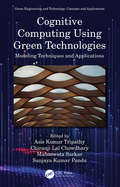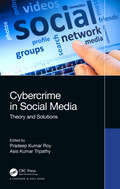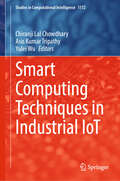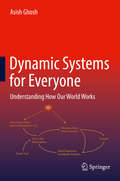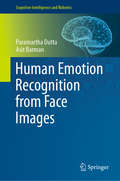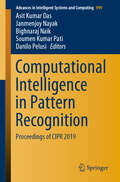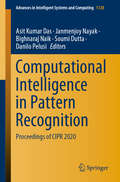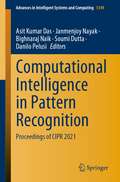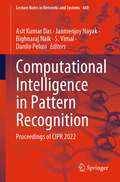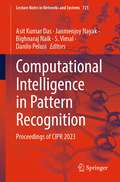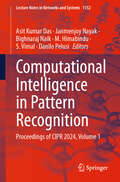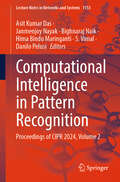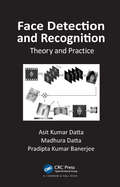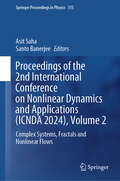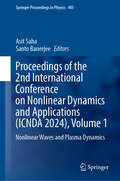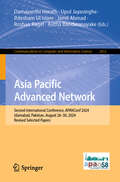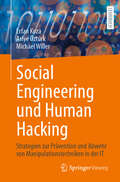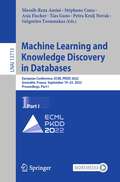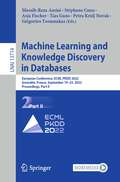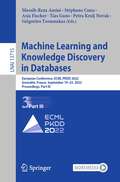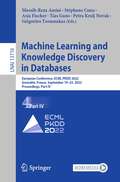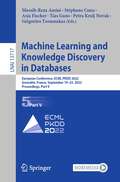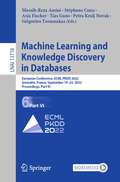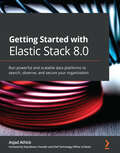- Table View
- List View
Cognitive Computing Using Green Technologies: Modeling Techniques and Applications (Green Engineering and Technology)
by Asis Kumar TripathyCognitive Computing is a new topic which aims to simulate human thought processes using computers that self-learn through data mining, pattern recognition, and natural language processing. This book focuses on the applications of Cognitive Computing in areas like Robotics, Blockchain, Deep Learning, and Wireless Technologies. This book covers the basics of Green Computing, discusses Cognitive Science methodologies in Robotics, Computer Science, Wireless Networks, and Deep Learning. It goes on to present empirical data and research techniques, modelling techniques and offers a data-driven approach to decision making and problem solving. This book is written for researchers, academicians, undergraduate and graduate students, and industry persons who are working on current applications of Cognitive Computing.
Cybercrime in Social Media: Theory and Solutions
by Asis Kumar Tripathy Pradeep Kumar RoyThis reference text presents the important components for grasping the potential of social computing with an emphasis on concerns, challenges, and benefits of the social platform in depth. Features: Detailed discussion on social-cyber issues, including hate speech, cyberbullying, and others Discusses usefulness of social platforms for societal needs Includes framework to address the social issues with their implementations Covers fake news and rumor detection models Describes sentimental analysis of social posts with advanced learning techniques The book is ideal for undergraduate, postgraduate, and research students who want to learn about the issues, challenges, and solutions of social platforms in depth.
Smart Computing Techniques in Industrial IoT (Studies in Computational Intelligence #1172)
by Yulei Wu Chiranji Lal Chowdhary Asis Kumar TripathyThe book provides a conceptual framework and roadmap for applications and research trends in Smart Computing Techniques in Industrial IoT. This volume aims to provide information on emerging fields of intelligent computing techniques with a particular emphasis on industrial IoT development and applications of artificial intelligence, deep learning techniques, computational intelligence methods, the Internet of Medical Things (IoMT), optimization techniques, blockchain, and cloud computing. It will be a useful guide for undergraduate and postgraduate students studying artificial intelligence, deep learning, industry 4.0, industry 5.0, smart cities, machine learning, deep learning computational intelligence, and edge/cloud computing.
Dynamic Systems for Everyone: Understanding How Our World Works
by Asish GhoshSystems are everywhere and we are surrounded by them. We are a complex amalgam of systems that enable us to interact with an endless array of external systems in our daily lives. They are electrical, mechanical, social, biological, and many other types that control our environment and our well-being. By appreciating how these systems function, will broaden our understanding of how our world works. Readers from a variety of disciplines will benefit from the knowledge of system behavior they will gain from this book and will be able to apply those principles in various contexts. The treatment of the subject is non-mathematical, and the book considers some of the latest concepts in the systems discipline, such as agent based systems, optimization, and discrete events and procedures. The diverse range of examples provided in this book, will allow readers to:Apply system knowledge at work and in daily life without deep mathematical knowledge;Build models and simulate system behaviors on a personal computer; Optimize systems in many different ways;Reduce or eliminate unintended consequences;Develop a holistic world view .This book will enable readers to not only better interact with the systems in their professional and daily lives, but also allow them to develop and evaluate them for their effectiveness in achieving their designed purpose.Comments from Reviewers: “This is a marvelously well written introduction to Systems Thinking and System Dynamics - I like it because it introduces Systems Thinking with meaningful examples, which everyone should be able to readily connect” - Gene Bellinger, Organizational theorist, systems thinker, and consultant, Director Systems Thinking World “Excellent book ...very well written. Mr. Ghosh's world view of system thinking is truly unique” - Peter A. Rizzi, Professor Emeritus, University of Massachusetts Dartmouth “A thorough reading of the book provides an interesting way to view many problems in our society” –Bradford T. Stokes, Poppleton Chair and Professor Emeritus, The Ohio State University College of Medicine “This is a very good and very readable book that is a must read for any person involved in systems theory in any way - which may actually include just about everyone” - Peter G. Martin, Vice President Business Value Consulting, Schneider Electric
Human Emotion Recognition from Face Images (Cognitive Intelligence and Robotics)
by Paramartha Dutta Asit BarmanThis book discusses human emotion recognition from face images using different modalities, highlighting key topics in facial expression recognition, such as the grid formation, distance signature, shape signature, texture signature, feature selection, classifier design, and the combination of signatures to improve emotion recognition. The book explains how six basic human emotions can be recognized in various face images of the same person, as well as those available from benchmark face image databases like CK+, JAFFE, MMI, and MUG. The authors present the concept of signatures for different characteristics such as distance and shape texture, and describe the use of associated stability indices as features, supplementing the feature set with statistical parameters such as range, skewedness, kurtosis, and entropy. In addition, they demonstrate that experiments with such feature choices offer impressive results, and that performance can be further improved by combining the signatures rather than using them individually.There is an increasing demand for emotion recognition in diverse fields, including psychotherapy, biomedicine, and security in government, public and private agencies. This book offers a valuable resource for researchers working in these areas.
Computational Intelligence in Pattern Recognition: Proceedings of CIPR 2019 (Advances in Intelligent Systems and Computing #999)
by Janmenjoy Nayak Bighnaraj Naik Asit Kumar Das Soumen Kumar Pati Danilo PelusiThis book presents practical development experiences in different areas of data analysis and pattern recognition, focusing on soft computing technologies, clustering and classification algorithms, rough set and fuzzy set theory, evolutionary computations, neural science and neural network systems, image processing, combinatorial pattern matching, social network analysis, audio and video data analysis, data mining in dynamic environments, bioinformatics, hybrid computing, big data analytics and deep learning. It also provides innovative solutions to the challenges in these areas and discusses recent developments.
Computational Intelligence in Pattern Recognition: Proceedings of CIPR 2020 (Advances in Intelligent Systems and Computing #1120)
by Janmenjoy Nayak Bighnaraj Naik Asit Kumar Das Soumi Dutta Danilo PelusiThis book features high-quality research papers presented at the 2nd International Conference on Computational Intelligence in Pattern Recognition (CIPR 2020), held at the Institute of Engineering and Management, Kolkata, West Bengal, India, on 4–5 January 2020. It includes practical development experiences in various areas of data analysis and pattern recognition, focusing on soft computing technologies, clustering and classification algorithms, rough set and fuzzy set theory, evolutionary computations, neural science and neural network systems, image processing, combinatorial pattern matching, social network analysis, audio and video data analysis, data mining in dynamic environments, bioinformatics, hybrid computing, big data analytics and deep learning. It also provides innovative solutions to the challenges in these areas and discusses recent developments.
Computational Intelligence in Pattern Recognition: Proceedings of CIPR 2021 (Advances in Intelligent Systems and Computing #1349)
by Janmenjoy Nayak Bighnaraj Naik Asit Kumar Das Soumi Dutta Danilo PelusiThis book features high-quality research papers presented at the 3rd International Conference on Computational Intelligence in Pattern Recognition (CIPR 2021), held at the Institute of Engineering and Management, Kolkata, West Bengal, India, on 24 – 25 April 2021. It includes practical development experiences in various areas of data analysis and pattern recognition, focusing on soft computing technologies, clustering and classification algorithms, rough set and fuzzy set theory, evolutionary computations, neural science and neural network systems, image processing, combinatorial pattern matching, social network analysis, audio and video data analysis, data mining in dynamic environments, bioinformatics, hybrid computing, big data analytics and deep learning. It also provides innovative solutions to the challenges in these areas and discusses recent developments.
Computational Intelligence in Pattern Recognition: Proceedings of CIPR 2022 (Lecture Notes in Networks and Systems #480)
by Janmenjoy Nayak Bighnaraj Naik Asit Kumar Das Danilo Pelusi S. VimalThis book features high-quality research papers presented at the 4th International Conference on Computational Intelligence in Pattern Recognition (CIPR 2022), held at Indian Institute of Engineering Science and Technology, Shibpur, Howrah, West Bengal, India, during 23 – 24 April 2022. It includes practical development experiences in various areas of data analysis and pattern recognition, focusing on soft computing technologies, clustering and classification algorithms, rough set and fuzzy set theory, evolutionary computations, neural science and neural network systems, image processing, combinatorial pattern matching, social network analysis, audio and video data analysis, data mining in dynamic environments, bioinformatics, hybrid computing, big data analytics and deep learning. It also provides innovative solutions to the challenges in these areas and discusses recent developments.
Computational Intelligence in Pattern Recognition: Proceedings of CIPR 2023 (Lecture Notes in Networks and Systems #725)
by Janmenjoy Nayak Bighnaraj Naik Asit Kumar Das Danilo Pelusi S. VimalThis book features high-quality research papers presented at the 5th International Conference on Computational Intelligence in Pattern Recognition (CIPR 2023), held at Department of Computer Science and Engineering, Techno Main Salt Lake, West Bengal, India, during May 27–28, 2023. It includes practical development experiences in various areas of data analysis and pattern recognition, focusing on soft computing technologies, clustering and classification algorithms, rough set and fuzzy set theory, evolutionary computations, neural science and neural network systems, image processing, combinatorial pattern matching, social network analysis, audio and video data analysis, data mining in dynamic environments, bioinformatics, hybrid computing, big data analytics, and deep learning. It also provides innovative solutions to the challenges in these areas and discusses recent developments.
Computational Intelligence in Pattern Recognition: Proceedings of CIPR 2024, Volume 1 (Lecture Notes in Networks and Systems #1152)
by Janmenjoy Nayak Bighnaraj Naik Asit Kumar Das Danilo Pelusi S. Vimal M. HimabinduThis book features high-quality research papers presented at the 6th International Conference on Computational Intelligence in Pattern Recognition (CIPR 2024), held at Maharaja Sriram Chandra Bhanja Deo University (MSCB University), Baripada, Odisha, India, during March 15–16, 2024. It includes practical development experiences in various areas of data analysis and pattern recognition, focusing on soft computing technologies, clustering and classification algorithms, rough set and fuzzy set theory, evolutionary computations, neural science and neural network systems, image processing, combinatorial pattern matching, social network analysis, audio and video data analysis, data mining in dynamic environments, bioinformatics, hybrid computing, big data analytics, and deep learning. It also provides innovative solutions to the challenges in these areas and discusses recent developments.
Computational Intelligence in Pattern Recognition: Proceedings of CIPR 2024, Volume 2 (Lecture Notes in Networks and Systems #1153)
by Janmenjoy Nayak Bighnaraj Naik Asit Kumar Das Danilo Pelusi S. Vimal Hima Bindu MaringantiThis book features high-quality research papers presented at the 6th International Conference on Computational Intelligence in Pattern Recognition (CIPR 2024), held at Maharaja Sriram Chandra Bhanja Deo University (MSCB University), Baripada, Odisha, India, during March 15–16, 2024. It includes practical development experiences in various areas of data analysis and pattern recognition, focusing on soft computing technologies, clustering and classification algorithms, rough set and fuzzy set theory, evolutionary computations, neural science and neural network systems, image processing, combinatorial pattern matching, social network analysis, audio and video data analysis, data mining in dynamic environments, bioinformatics, hybrid computing, big data analytics, and deep learning. It also provides innovative solutions to the challenges in these areas and discusses recent developments.
Face Detection and Recognition: Theory and Practice
by Asit Kumar Datta Madhura Datta Pradipta Kumar BanerjeeFace detection and recognition are the nonintrusive biometrics of choice in many security applications. Examples of their use include border control, driver's license issuance, law enforcement investigations, and physical access control.Face Detection and Recognition: Theory and Practice elaborates on and explains the theory and practice of face de
Proceedings of the 2nd International Conference on Nonlinear Dynamics and Applications: Complex Systems, Fractals and Nonlinear Flows (Springer Proceedings in Physics #315)
by Santo Banerjee Asit SahaThis book covers the latest advancements and applications of nonlinear dynamics in various fields of science and engineering, presenting a curated selection of peer-reviewed contributions at the 2nd International Conference on Nonlinear Dynamics and Applications (ICNDA 2024) at Sikkim Manipal Institute of Technology (SMIT). Organized by the Department of Mathematics, SMIT, SMU, this international conference provides a platform for scientists, researchers, and inventors to share their findings and exchange ideas in the ever-evolving field of nonlinear dynamics. This book comprises three volumes. Volume 2 focuses on chaos, complexity, and fractals in dynamical systems. It covers topics such as novel methods for solving population balance models; analysis of fractal structures and nonlinear partial differential equations; dynamics of disease therapy and cytokine interactions; stability and behavior of predator-prey and ecological systems; fluid dynamics and heat transfer in nanofluids; and numerical and analytical approaches to material and structural optimization
Proceedings of the 2nd International Conference on Nonlinear Dynamics and Applications: Nonlinear Waves and Plasma Dynamics (Springer Proceedings in Physics #405)
by Santo Banerjee Asit SahaThis book covers the latest advancements and applications of nonlinear dynamics in various fields of science and engineering, presenting a curated selection of peer-reviewed contributions at the 2nd International Conference on Nonlinear Dynamics and Applications (ICNDA 2024) at Sikkim Manipal Institute of Technology (SMIT). Organized by the Department of Mathematics, SMIT, SMU, this international conference provides a platform for scientists, researchers, and inventors to share their findings and exchange ideas in the ever-evolving field of nonlinear dynamics. This book comprises three volumes. Volume 1 focuses on the investigation of nonlinear waves and plasma dynamics. It covers topics such as strong Landau damping, electron plasma waves, ion-acoustic waves, dusty plasma, dust-acoustic waves, dust-ion-acoustic waves, kinetic Alfven waves, solitary wave, shock waves, periodic wave, cnoidal wave, superperiodic wave, soliton, resonance, lump soliton, multi-soliton, breather wave, upper hybrid wave, atmospheric internal wave, mathematical and analytical methods, quantum and relativistic plasmas, wave instabilities and interactions, fractional and complex systems, nonlinear optical phenomena, Gaussian laser beam, chaos and multistability, and other specific plasma studies.
Obesity and its Impact on Health
by Methil Kannan Kutty Asita ElengoeThis book summarizes the effects of obesity on health and its correlation with a wide range of debilitating and life-threatening conditions in humans. It discusses the possible pathological mechanisms that are involved in the development of obesity and highlights obesity-associated molecular mechanisms that contribute to reproductive dysfunctions in men and women. The book provides mechanistic insights on the role of obesity in cardiovascular and respiratory disorders, and examines the role of the complementary molecular mechanism of the gut microbiota in the development of obesity. It also reviews the interaction between the metabolic system and immune cells in the pathogenesis of obesity-associated diseases. Lastly, it assesses the latest advances in nanomedicine as an emerging strategy for the treatment of obesity.
Asia Pacific Advanced Network: Second International Conference, APANConf 2024, Islamabad, Pakistan, August 26–30, 2024, Revised Selected Papers (Communications in Computer and Information Science #2412)
by Jamil Ahmad Damayanthi Herath Upul Jayasinghe Roshan Ragel Ihtesham Ul Islam Asitha BandaranayakeThis book constitutes the refereed proceedings of the Second International Conference on Asia Pacific Advanced Network, APANConf 2024, held in Islamabad, Pakistan, during August 26–30, 2024. The 14 full papers and 1 short paper included in this book were carefully reviewed and selected from 56 submissions. These papers focus on Artificial Intelligence and Machine Learning, Computer Vision and Wireless Communications and Networks.
Social Engineering und Human Hacking: Strategien zur Prävention und Abwehr von Manipulationstechniken in der IT
by Erfan Koza Asiye Öztürk Michael WillerEntdecken Sie die psychologischen Tricks und Techniken, mit denen Human Hacker Ihre persönlichen Gefühle, Eigenschaften und digitale Verhaltensmuster ausnutzen, um die Informationssicherheit gezielt zu kompromittieren. Dieses Lehrbuch bietet Ihnen einen spielerischen Ansatz, um die Funktionsweise von Social Engineering zu verstehen und sich erfolgreich dagegen zu verteidigen. Erfahren Sie zudem, wie Sie Ihre Wahrnehmung schärfen, Ihre Emotionen kontrollieren und effektive Abwehrstrategien entwickeln können, um Ihre Daten und Ihr Unternehmen vor den Taktiken der Angreifer zu schützen. Ausgestattet mit psychologischen Denkmodellen sowie Abwehrstrategien, werden Sie bereit sein, sich den Herausforderungen des modernen Sicherheitsumfelds zu stellen.
Machine Learning and Knowledge Discovery in Databases: European Conference, ECML PKDD 2022, Grenoble, France, September 19–23, 2022, Proceedings, Part I (Lecture Notes in Computer Science #13713)
by Massih-Reza Amini Petra Kralj Novak Grigorios Tsoumakas Stéphane Canu Asja Fischer Tias GunsThe multi-volume set LNAI 13713 until 13718 constitutes the refereed proceedings of the European Conference on Machine Learning and Knowledge Discovery in Databases, ECML PKDD 2022, which took place in Grenoble, France, in September 2022.The 236 full papers presented in these proceedings were carefully reviewed and selected from a total of 1060 submissions. In addition, the proceedings include 17 Demo Track contributions. The volumes are organized in topical sections as follows: Part I: Clustering and dimensionality reduction; anomaly detection; interpretability and explainability; ranking and recommender systems; transfer and multitask learning; Part II: Networks and graphs; knowledge graphs; social network analysis; graph neural networks; natural language processing and text mining; conversational systems; Part III: Deep learning; robust and adversarial machine learning; generative models; computer vision; meta-learning, neural architecture search; Part IV: Reinforcement learning; multi-agent reinforcement learning; bandits and online learning; active and semi-supervised learning; private and federated learning; . Part V: Supervised learning; probabilistic inference; optimal transport; optimization; quantum, hardware; sustainability; Part VI: Time series; financial machine learning; applications; applications: transportation; demo track.
Machine Learning and Knowledge Discovery in Databases: European Conference, ECML PKDD 2022, Grenoble, France, September 19–23, 2022, Proceedings, Part II (Lecture Notes in Computer Science #13714)
by Massih-Reza Amini Petra Kralj Novak Grigorios Tsoumakas Stéphane Canu Asja Fischer Tias GunsThe multi-volume set LNAI 13713 until 13718 constitutes the refereed proceedings of the European Conference on Machine Learning and Knowledge Discovery in Databases, ECML PKDD 2022, which took place in Grenoble, France, in September 2022.The 236 full papers presented in these proceedings were carefully reviewed and selected from a total of 1060 submissions. In addition, the proceedings include 17 Demo Track contributions. The volumes are organized in topical sections as follows: Part I: Clustering and dimensionality reduction; anomaly detection; interpretability and explainability; ranking and recommender systems; transfer and multitask learning; Part II: Networks and graphs; knowledge graphs; social network analysis; graph neural networks; natural language processing and text mining; conversational systems; Part III: Deep learning; robust and adversarial machine learning; generative models; computer vision; meta-learning, neural architecture search; Part IV: Reinforcement learning; multi-agent reinforcement learning; bandits and online learning; active and semi-supervised learning; private and federated learning; . Part V: Supervised learning; probabilistic inference; optimal transport; optimization; quantum, hardware; sustainability; Part VI: Time series; financial machine learning; applications; applications: transportation; demo track.
Machine Learning and Knowledge Discovery in Databases: European Conference, ECML PKDD 2022, Grenoble, France, September 19–23, 2022, Proceedings, Part III (Lecture Notes in Computer Science #13715)
by Massih-Reza Amini Petra Kralj Novak Grigorios Tsoumakas Stéphane Canu Asja Fischer Tias GunsThe multi-volume set LNAI 13713 until 13718 constitutes the refereed proceedings of the European Conference on Machine Learning and Knowledge Discovery in Databases, ECML PKDD 2022, which took place in Grenoble, France, in September 2022.The 236 full papers presented in these proceedings were carefully reviewed and selected from a total of 1060 submissions. In addition, the proceedings include 17 Demo Track contributions. The volumes are organized in topical sections as follows: Part I: Clustering and dimensionality reduction; anomaly detection; interpretability and explainability; ranking and recommender systems; transfer and multitask learning; Part II: Networks and graphs; knowledge graphs; social network analysis; graph neural networks; natural language processing and text mining; conversational systems; Part III: Deep learning; robust and adversarial machine learning; generative models; computer vision; meta-learning, neural architecture search; Part IV: Reinforcement learning; multi-agent reinforcement learning; bandits and online learning; active and semi-supervised learning; private and federated learning; . Part V: Supervised learning; probabilistic inference; optimal transport; optimization; quantum, hardware; sustainability; Part VI: Time series; financial machine learning; applications; applications: transportation; demo track.
Machine Learning and Knowledge Discovery in Databases: European Conference, ECML PKDD 2022, Grenoble, France, September 19–23, 2022, Proceedings, Part IV (Lecture Notes in Computer Science #13716)
by Massih-Reza Amini Petra Kralj Novak Grigorios Tsoumakas Stéphane Canu Asja Fischer Tias GunsThe multi-volume set LNAI 13713 until 13718 constitutes the refereed proceedings of the European Conference on Machine Learning and Knowledge Discovery in Databases, ECML PKDD 2022, which took place in Grenoble, France, in September 2022.The 236 full papers presented in these proceedings were carefully reviewed and selected from a total of 1060 submissions. In addition, the proceedings include 17 Demo Track contributions. The volumes are organized in topical sections as follows: Part I: Clustering and dimensionality reduction; anomaly detection; interpretability and explainability; ranking and recommender systems; transfer and multitask learning; Part II: Networks and graphs; knowledge graphs; social network analysis; graph neural networks; natural language processing and text mining; conversational systems; Part III: Deep learning; robust and adversarial machine learning; generative models; computer vision; meta-learning, neural architecture search; Part IV: Reinforcement learning; multi-agent reinforcement learning; bandits and online learning; active and semi-supervised learning; private and federated learning; Part V: Supervised learning; probabilistic inference; optimal transport; optimization; quantum, hardware; sustainability; Part VI: Time series; financial machine learning; applications; applications: transportation; demo track.
Machine Learning and Knowledge Discovery in Databases: European Conference, ECML PKDD 2022, Grenoble, France, September 19–23, 2022, Proceedings, Part V (Lecture Notes in Computer Science #13717)
by Massih-Reza Amini Petra Kralj Novak Grigorios Tsoumakas Stéphane Canu Asja Fischer Tias GunsThe multi-volume set LNAI 13713 until 13718 constitutes the refereed proceedings of the European Conference on Machine Learning and Knowledge Discovery in Databases, ECML PKDD 2022, which took place in Grenoble, France, in September 2022.The 236 full papers presented in these proceedings were carefully reviewed and selected from a total of 1060 submissions. In addition, the proceedings include 17 Demo Track contributions. The volumes are organized in topical sections as follows: Part I: Clustering and dimensionality reduction; anomaly detection; interpretability and explainability; ranking and recommender systems; transfer and multitask learning; Part II: Networks and graphs; knowledge graphs; social network analysis; graph neural networks; natural language processing and text mining; conversational systems; Part III: Deep learning; robust and adversarial machine learning; generative models; computer vision; meta-learning, neural architecture search; Part IV: Reinforcement learning; multi-agent reinforcement learning; bandits and online learning; active and semi-supervised learning; private and federated learning; . Part V: Supervised learning; probabilistic inference; optimal transport; optimization; quantum, hardware; sustainability; Part VI: Time series; financial machine learning; applications; applications: transportation; demo track.
Machine Learning and Knowledge Discovery in Databases: European Conference, ECML PKDD 2022, Grenoble, France, September 19–23, 2022, Proceedings, Part VI (Lecture Notes in Computer Science #13718)
by Massih-Reza Amini Petra Kralj Novak Grigorios Tsoumakas Stéphane Canu Asja Fischer Tias GunsThe multi-volume set LNAI 13713 until 13718 constitutes the refereed proceedings of the European Conference on Machine Learning and Knowledge Discovery in Databases, ECML PKDD 2022, which took place in Grenoble, France, in September 2022.The 236 full papers presented in these proceedings were carefully reviewed and selected from a total of 1060 submissions. In addition, the proceedings include 17 Demo Track contributions. The volumes are organized in topical sections as follows: Part I: Clustering and dimensionality reduction; anomaly detection; interpretability and explainability; ranking and recommender systems; transfer and multitask learning; Part II: Networks and graphs; knowledge graphs; social network analysis; graph neural networks; natural language processing and text mining; conversational systems; Part III: Deep learning; robust and adversarial machine learning; generative models; computer vision; meta-learning, neural architecture search; Part IV: Reinforcement learning; multi-agent reinforcement learning; bandits and online learning; active and semi-supervised learning; private and federated learning; . Part V: Supervised learning; probabilistic inference; optimal transport; optimization; quantum, hardware; sustainability; Part VI: Time series; financial machine learning; applications; applications: transportation; demo track.
Getting Started with Elastic Stack 8.0: Run powerful and scalable data platforms to search, observe, and secure your organization
by Asjad Athick Shay BanonUse the Elastic Stack for search, security, and observability-related use cases while working with large amounts of data on-premise and on the cloudKey FeaturesLearn the core components of the Elastic Stack and how they work togetherBuild search experiences, monitor and observe your environments, and defend your organization from cyber attacksGet to grips with common architecture patterns and best practices for successfully deploying the Elastic StackBook DescriptionThe Elastic Stack helps you work with massive volumes of data to power use cases in the search, observability, and security solution areas.This three-part book starts with an introduction to the Elastic Stack with high-level commentary on the solutions the stack can be leveraged for. The second section focuses on each core component, giving you a detailed understanding of the component and the role it plays. You'll start by working with Elasticsearch to ingest, search, analyze, and store data for your use cases. Next, you'll look at Logstash, Beats, and Elastic Agent as components that can collect, transform, and load data. Later chapters help you use Kibana as an interface to consume Elastic solutions and interact with data on Elasticsearch. The last section explores the three main use cases offered on top of the Elastic Stack. You'll start with a full-text search and look at real-world outcomes powered by search capabilities. Furthermore, you'll learn how the stack can be used to monitor and observe large and complex IT environments. Finally, you'll understand how to detect, prevent, and respond to security threats across your environment. The book ends by highlighting architecture best practices for successful Elastic Stack deployments.By the end of this book, you'll be able to implement the Elastic Stack and derive value from it.What you will learnConfigure Elasticsearch clusters with different node types for various architecture patternsIngest different data sources into Elasticsearch using Logstash, Beats, and Elastic AgentBuild use cases on Kibana including data visualizations, dashboards, machine learning jobs, and alertsDesign powerful search experiences on top of your data using the Elastic StackSecure your organization and learn how the Elastic SIEM and Endpoint Security capabilities can helpExplore common architectural considerations for accommodating more complex requirementsWho this book is forDevelopers and solutions architects looking to get hands-on experience with search, security, and observability-related use cases on the Elastic Stack will find this book useful. This book will also help tech leads and product owners looking to understand the value and outcomes they can derive for their organizations using Elastic technology. No prior knowledge of the Elastic Stack is required.
